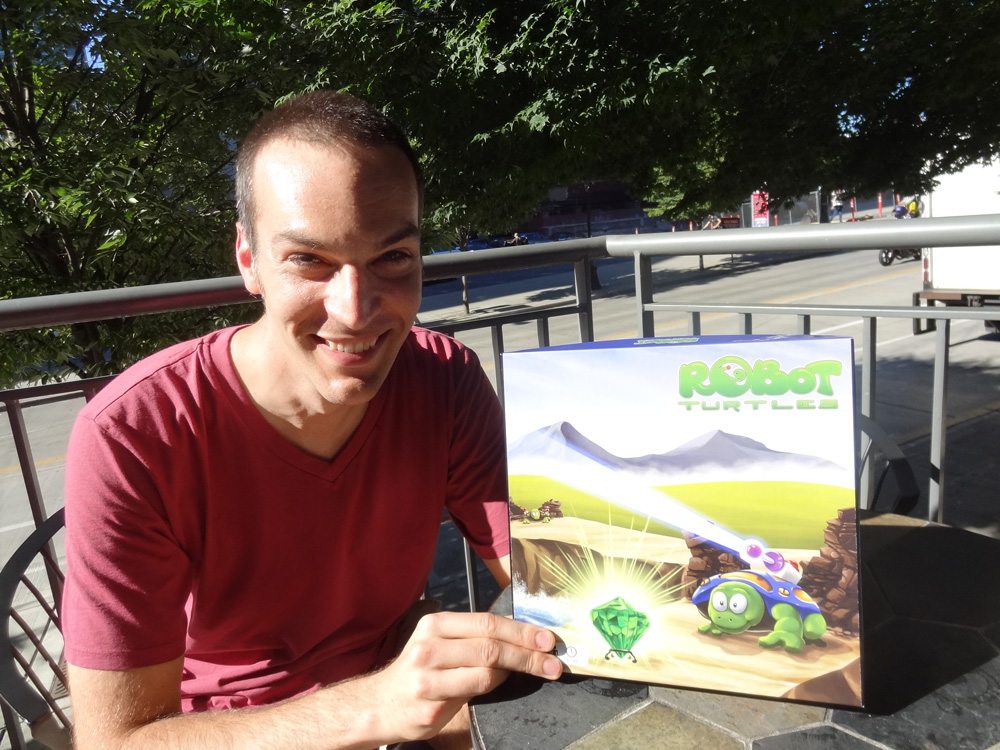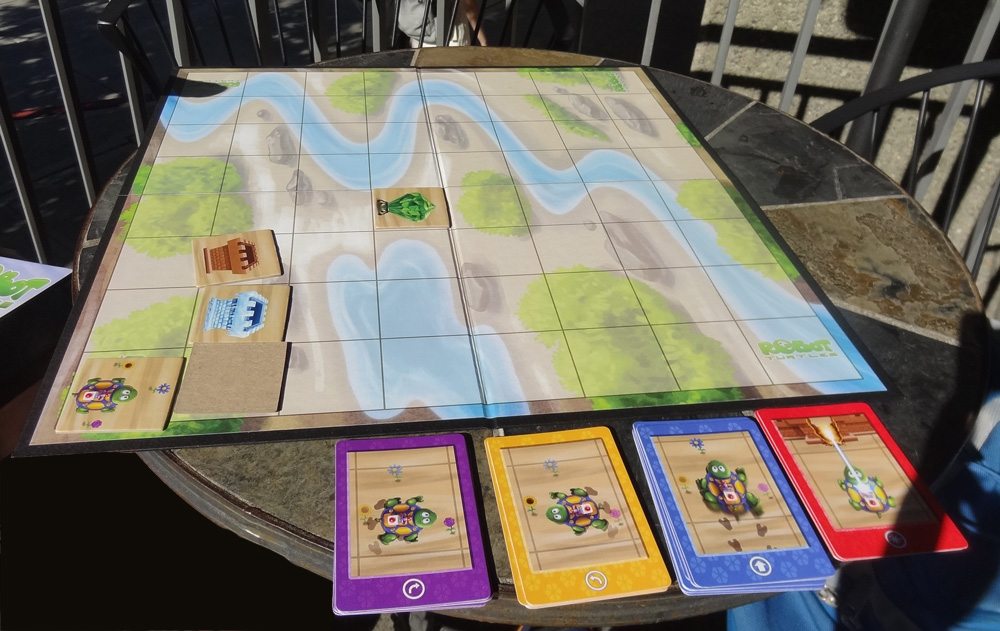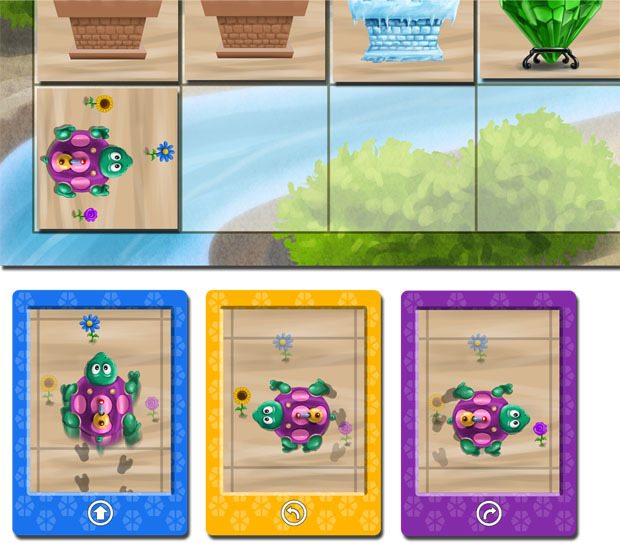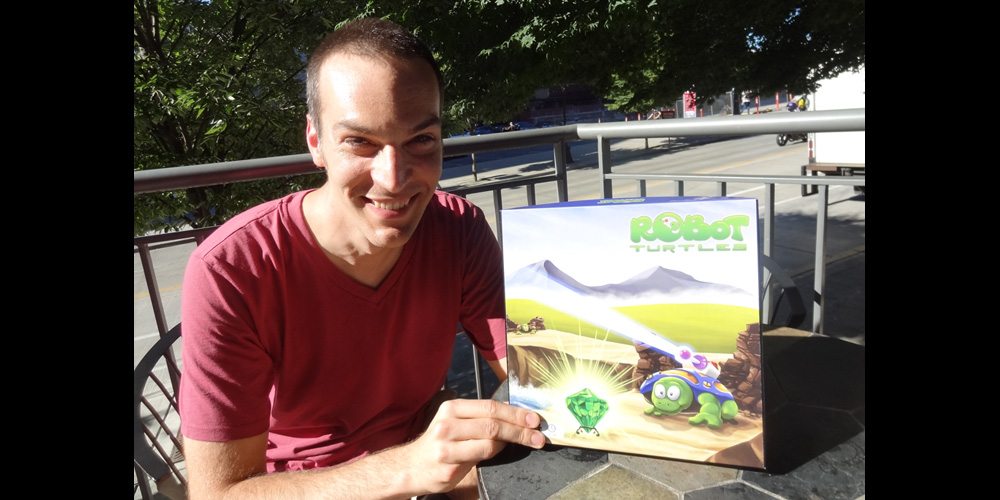
This past weekend I attended PAX Prime, a Seattle-based convention focused on gaming and geek culture. I’d gotten a request through the GeekDad grapevine to take a look at a Kickstarter board game by some guy who knew somebody who knew our fearless leader Ken Denmead, and figured it wouldn’t hurt to take a look. We arranged to meet up at a nearby coffee shop, since he wasn’t actually attending PAX himself, and I started to regret scheduling a meeting while the exhibit halls were still open. Did I really want to miss out on PAX gaming goodness to go look at some homemade game prototype?
Well, it turns out Dan Shapiro isn’t just “some guy”–among other things, his startup Sparkbuy was snapped up by Google, allowing him to become an angel investor in other startups. Shapiro was excited enough about his game, Robot Turtles, to take a leave of absence from Google to pursue it. After spending an hour with Shapiro, I could see why.

First, a quick overview of what Robot Turtles actually is: It’s a board game designed to teach programming to kids from about ages 3 to 8. It’s based on Logo (kids, ask your parents!) and the kids get to program a turtle’s movement around the board, trying to collect the jewels. The kids lay down cards that make the turtle move forward or turn, and the adult is in charge of moving the turtle according to the program. It’s designed for up to four players (not including the “Turtle Mover,” but it’s really like running four solitaire games in parallel–though of course with more experienced players you could turn it into something like Robo Rally.
Speaking of Robo Rally, I actually mentioned that Robot Turtles reminded me a little bit of a few other games that had a “programmed move” mechanic: Robo Rally, Pirate Dice, and Wings of War all came to mind. Shapiro hadn’t played any of them when he came up with Robot Turtles with his four-year-old twins, but he did get an introduction to Richard Garfield (designer of Robo Rally) who reportedly liked the idea.

Robot Turtles does play a little bit like these other programming games: the players put down cards in order to direct the turtle to the goal. One thing that I really liked about Shapiro’s approach, though, is that the game is specifically designed to require parent-child interaction. You read the rules, and all you tell your kids is put down cards and try to get the jewel. You have to know how the cards work, but they don’t–they get to just experiment and play cards to see what happens.
It starts off simple: You put down the turtle and the jewel, and they get a stack of movement cards. Later, they “unlock” the ice wall, which blocks the turtle … and then the laser that melts the ice wall … and then the stone wall that can’t be melted. Eventually you let them play three cards at a time, and then the entire string from start to jewel all at once. There’s even a “function frog” for advanced play that lets you call a separate function within the program. But throughout it all, the kids are discovering how things work by playing cards and seeing the results, not by an explicit explanation. It’s the reason that Shapiro decided to make it a game rather than an app, so that there would be this parent-child interaction. You get to spend time with each other, and as a bonus, your kid learns some basic programming concepts. Everybody wins!

Shapiro said that he’d discussed his idea with some people in the board game industry, and they told him his idea wasn’t marketable. Why? Because parents weren’t interested in games they had to sit and play with their kids. They wanted something their kids would go play on their own so they had time to do something else. Now, any adult who’s had to sit and play a never-ending game of Chutes & Ladders can sympathize with that, but that’s why I’m all for supporting great games that don’t drive the adults bonkers. Although the adult’s role in Robot Turtles is just following the kid’s directions, I can tell that it would be fascinating to watch your kid figure out how to control the turtle. Come on, parents! Play something cool with your kids! Show these industry experts that they’re wrong.
The other fun thing about Robot Turtles: at some point your kids might figure out that by playing the game, they’re actually controlling you. For once, they get to tell mom or dad what to do by playing cards! Now there’s an idea that’ll get them hooked on games.
Now, I’ll admit: I don’t think Robot Turtles is the most amazing or original game in the world. Personally I really like Pirate Dice (which is actually a retheme of Robo Rally Express)–but that sort of requires that your kids already understand how to program. But if my kids were a bit younger–or when my baby gets a bit older–Robot Turtles would be a great primer to prepare them for these other games, not to mention the foundation for programming skills later on.
Shapiro’s family arrived to pick him up after we’d been talking for about an hour, and I couldn’t believe how quickly the time had passed. His enthusiasm for his project and his approach to programming and parenting was contagious, and I could easily have spent another hour or two talking about Kickstarter, kids, and games. It’s clear that I’m not the only one who loves the idea: after only the first day of funding, Robot Turtles has already reached nearly double its $25,000 goal.
The game may not be available after the Kickstarter is over: Shapiro’s going back to Google after his leave of absence is over and isn’t planning to start a board game publishing company. So if you think you may want a copy, your best bet is to check it out now and pledge for the Kickstarter. I did–I’ll give it a shot with my older daughters, but really I’m hanging onto it for my four-month-old.




Done!
That’s a very interesting concept, and I do like the board game aspect versus a PC. My son has an iPad game called “My Robot Friend” that has a similar concept — you program the robot with cards to move forward, backward, fire missiles, etc. But again… like the idea of a non-electronic game. Backed it!
Thanks for the overview of this project. It definitely got me to take another look at it and I have at least starred it for the future. The concept is definitely interesting, though my oldest is past the age range for this game. I’m intrigued by the ability to use this with kids as young as 3 and it looks like a great alternative to Candy Land and the like.
Being a NetLogo fan, he had me at “turtle”.
Other than this game simply being a great embodiment of the spirit of Kickstarter (i.e., help someone get a project finished), don’t forget about the power of a Kickstarter community to iterate. Dan noted that preproduction has begun, but if there are ways to improve the game, it will be great to see what community suggestions arise.
Very cool idea. Nice artwork too!